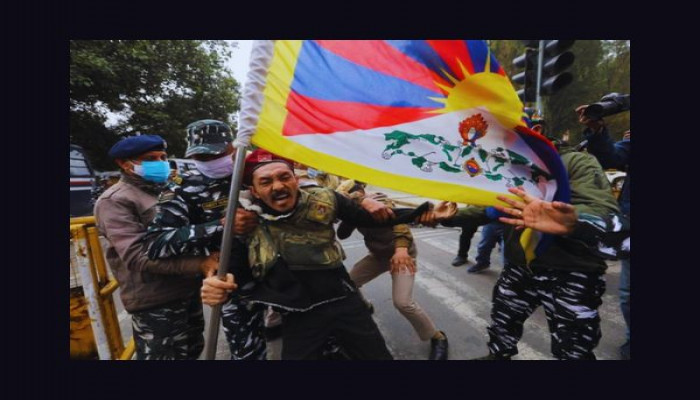Tibetans worldwide demand probe into mysterious death of Buddhist leader in Vietnam
- In Reports
- 07:23 PM, Apr 12, 2025
- Myind Staff
Tibetan communities and human rights organisations across the world are demanding a full and impartial investigation into the suspicious death of revered Tibetan Buddhist leader Tulku Hungkar Dorje, who passed away under Chinese custody in Vietnam late last month. His death has triggered widespread demonstrations, vigils, and diplomatic appeals calling for transparency and accountability from both Chinese and Vietnamese authorities.
On April 11, around 20 members of the Tibetan Youth Congress (TYC) staged a demonstration outside the Chinese Embassy in New Delhi. Protesters urged the international community to intervene and pressure Beijing and Hanoi to reveal the circumstances behind Dorje’s death. Before the protest, TYC activists submitted a formal petition at the Vietnamese Embassy, demanding an international probe, the immediate return of Dorje’s remains to his monastery and family, and the public release of all investigative findings.
Coordinated Global Outcry
Solidarity events have taken place in several countries. In London, members of the Tibetan community held a candlelight vigil opposite the Chinese Embassy, mourning the spiritual leader and demanding justice. A similar vigil took place in Dharamshala, the headquarters of the Tibetan Government-in-Exile, where participants expressed grief and concern over Dorje’s death and the secrecy surrounding it.
Six major Tibetan advocacy organisations—Tibet Justice Centre, International Tibet Network, Tibet Action Institute, Students for a Free Tibet, Free Tibet, and Australia Tibet Council—issued a joint letter calling for an urgent and independent investigation. The letter also demanded that Dorje’s remains be repatriated without delay to ensure he receives proper religious funeral rites in accordance with Tibetan Buddhist traditions.
Detention and Death Under Mysterious Circumstances
Tulku Hungkar Dorje was the abbot of Lungngon Monastery in Gade County, Golok, located in the Tibetan region. In August 2024, he reportedly faced repeated interrogations by Chinese authorities. By late September, he had fled to Vietnam, apparently seeking refuge from the mounting pressure.
On March 25, 2025, Dorje was detained by Vietnamese police in collaboration with Chinese intelligence agents. He was taken from his hotel room in Saigon (Ho Chi Minh City) during a joint operation. Just three days later, on March 28, he was moved to a local public security bureau, where he died the same day under unclear circumstances.
His body is currently being held at Vinmec Central Park International Hospital in Ho Chi Minh City. According to reports, on April 1, Chinese authorities summoned the administrative office of Lungngon Monastery to receive his official death certificate. There has been no explanation provided about the cause of death.
Access Restricted, Transparency Lacking
Efforts to recover Dorje’s remains have faced several obstacles. On April 5, five monks from Lungngon Monastery, escorted by Chinese officials, travelled to Vietnam to retrieve the body. However, on the same day, a closed-door meeting took place at the Chinese Embassy in Hanoi, attended only by Chinese representatives. Tibetan delegates were reportedly denied entry. It remains unclear whether the visiting monks were permitted to view or take custody of the body.
Adding to the secrecy, Vietnamese military personnel are currently stationed at the hospital, severely restricting access. Reports suggest that public entry to the facility has been blocked, further fueling concerns about possible cover-ups.
The death of Tulku Hungkar Dorje under suspicious circumstances while in Chinese custody on Vietnamese soil has sparked international concern and deepened mistrust among Tibetan communities. As pressure mounts on both governments to allow an independent inquiry, activists continue to demand truth, justice, and the return of the revered monk's remains to his spiritual home. The global Tibetan diaspora remains united in seeking answers and honoring the legacy of a prominent religious leader whose death they believe should not be forgotten or dismissed.







Comments